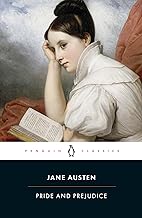
How to Read Jane Austen's Books on Essential novels
How to Read Jane Austen's Books on Essential Novels
Estimated Reading Time: 10-12 minutes
Introduction
Jane Austen, born in 1775 in Hampshire, England, remains one of the most celebrated authors in the English literary canon. Her keen observations of society, particularly the lives of women in the late 18th and early 19th centuries, offer timeless insights into human relationships, social class, and morality. Austen's novels, often characterized by their wit and irony, delve into the complexities of love, marriage, and the pursuit of happiness, making her works essential reading for anyone interested in literature and philosophy.
Austen's perspective on essential novels is unique because she blends social commentary with intricate character studies, allowing readers to engage with profound themes while enjoying the narrative. Her works reflect the cultural and historical context of her time, exploring the limitations placed on women and the societal expectations that shaped their lives. This guide will explore three of Austen's most significant novels—Pride and Prejudice, Emma, and Mansfield Park—and examine how each contributes to our understanding of essential novels.
Why Jane Austen's Perspective Matters
Jane Austen's literature is distinguished by her sharp social critique and her ability to portray the inner lives of her characters. Unlike many of her contemporaries, who often focused on grand historical events or moral absolutism, Austen's narratives are grounded in the everyday experiences of her characters. Her insights into the nuances of human behavior and relationships offer a valuable lens through which to examine the complexities of life.
Austen's works also challenge the social norms of her time. By presenting strong, intelligent female protagonists who navigate societal constraints, she invites readers to reflect on issues of gender, class, and personal agency. Her lasting impact is evident in the way her novels continue to resonate with modern readers, sparking discussions about love, identity, and social justice.
Overview of Recommended Books
Pride and Prejudice
Main Themes and Arguments: "Pride and Prejudice" centers on Elizabeth Bennet, a spirited young woman navigating the complexities of love and societal expectations. The novel explores themes of pride, prejudice, class, and the transformative power of self-awareness. Elizabeth's journey toward understanding herself and others serves as a critique of the rigid social hierarchy of the time.
Historical Context and Significance: Published in 1813, "Pride and Prejudice" reflects the early 19th-century British class system and the limited roles available to women. Through Elizabeth's defiance of societal norms, Austen challenges the status quo, advocating for personal integrity and emotional intelligence.
Key Insights and Takeaways:
- Self-Reflection: Elizabeth's growth emphasizes the importance of self-awareness and the willingness to confront one's biases.
- Social Commentary: The novel critiques class distinctions, illustrating how wealth and social status can distort human relationships.
- Romantic Ideals: Austen presents a nuanced view of love, arguing that true compatibility stems from mutual respect and understanding rather than mere attraction.
Why Read This Book: "Pride and Prejudice" is essential for understanding the dynamics of human relationships and societal expectations. Its exploration of personal growth and moral integrity makes it relevant for readers seeking insights into their own lives. Those interested in romance, social critique, or character development will find this novel particularly rewarding.
Emma
Main Themes and Arguments: "Emma" follows the life of its titular character, an affluent young woman who fancies herself a matchmaker. The novel explores themes of self-deception, social class, and the complexities of friendship and love. Emma's misguided attempts to orchestrate the romantic lives of others ultimately lead her to a deeper understanding of her own feelings.
Historical Context and Significance: Published in 1815, "Emma" reflects the changing social landscape of Regency England, where class distinctions were becoming more fluid. Austen's portrayal of a flawed yet relatable protagonist invites readers to consider the impact of privilege and the importance of humility.
Key Insights and Takeaways:
- Self-Deception: Emma's journey reveals the dangers of assuming one knows what is best for others, highlighting the importance of empathy and understanding.
- Social Dynamics: The novel illustrates the complexities of social interactions and the often arbitrary nature of class distinctions.
- Growth Through Mistakes: Emma's mistakes serve as a catalyst for her personal growth, emphasizing the value of learning from one's errors.
Why Read This Book: "Emma" is a rich exploration of character and social dynamics, making it essential for readers interested in the intricacies of human relationships. Those who appreciate character-driven narratives and social commentary will find this novel particularly engaging.
Mansfield Park
Main Themes and Arguments: "Mansfield Park" tells the story of Fanny Price, a shy and morally upright young woman raised in her wealthy relatives' home. The novel addresses themes of morality, social class, and the role of women in society. Fanny's steadfastness in her values amidst the moral ambiguity of those around her highlights the importance of integrity.
Historical Context and Significance: Published in 1814, "Mansfield Park" presents a more critical view of social class and morality compared to Austen's earlier works. The novel reflects the complexities of colonialism and wealth, as Fanny's relatives benefit from the slave trade, raising questions about the ethical implications of their lifestyle.
Key Insights and Takeaways:
- Moral Integrity: Fanny's character serves as a model of virtue, emphasizing the importance of staying true to one's principles in a morally ambiguous world.
- Class Critique: The novel critiques the moral failings of the upper class, encouraging readers to reflect on the ethical implications of wealth and privilege.
- Women's Agency: Fanny's journey underscores the limited options available to women, prompting discussions about agency and self-determination.
Why Read This Book: "Mansfield Park" is essential for understanding the moral and ethical dimensions of social class. Readers interested in themes of integrity, ethics, and the role of women in society will find this novel particularly thought-provoking.
How These Books Complement Each Other
Together, these three novels offer a comprehensive exploration of essential themes in Austen's work. "Pride and Prejudice" introduces readers to the dynamics of love and social class, while "Emma" delves into the complexities of self-deception and personal growth. "Mansfield Park" provides a critical lens on morality and social ethics, enriching the reader's understanding of the societal context in which Austen wrote.
Reading these novels in conjunction allows for a deeper appreciation of Austen's critique of societal norms and her exploration of the human condition. Each work builds upon the themes of the others, creating a nuanced understanding of love, class, and moral integrity.
Who Would Benefit from Reading These Books
These novels are ideal for a diverse audience:
- Students and Academics: Those studying literature, gender studies, or social history will find rich material for analysis.
- General Readers: Anyone interested in classic literature and the exploration of human relationships will appreciate Austen's wit and insight.
- Professionals Seeking Practical Wisdom: Readers looking for guidance on personal growth and ethical living can draw valuable lessons from Austen's characters.
- Anyone Seeking Personal Growth: Those interested in self-improvement and understanding social dynamics will benefit from the timeless themes in Austen's works.
Recommended Reading Order
- Start with: Pride and Prejudice - This novel serves as an accessible introduction to Austen's themes of love and social class, making it a perfect entry point for new readers.
- Continue with: Emma - Building on the insights gained from "Pride and Prejudice," this novel offers a deeper exploration of character and social dynamics.
- Advanced reading: Mansfield Park - This work challenges readers to confront moral and ethical questions, providing a more complex understanding of Austen's critique of society.
Tips for Getting the Most Out of Each Book:
- Take notes on character development and thematic elements as you read.
- Reflect on how the societal context influences the characters' decisions and relationships.
- Discuss the novels with others to gain diverse perspectives and insights.
Conclusion
Jane Austen's contributions to literature are invaluable, offering profound insights into essential themes that resonate across time and culture. Her exploration of love, class, and morality invites readers to reflect on their own lives and societal norms. By engaging with "Pride and Prejudice," "Emma," and "Mansfield Park," readers can gain a deeper understanding of the complexities of human relationships and the enduring relevance of Austen's ideas.
As you embark on this literary journey, let Austen's wit and wisdom inspire you to explore the intricacies of your own life and relationships. Dive into her world, and discover the timeless truths that await within her pages.
Tags: #Jane Austen #Essential novels #Philosophy #ReadingGuide #ClassicLiterature #Wisdom
Featured Books

Pride and Prejudice
by Jane Austen
Published: 1813
Austen's most popular novel, the unforgettable story of Elizabeth Bennet and Mr. DarcyFew have failed to be charmed by the witty and independent spirit of Elizabeth Bennet in Austen’s beloved classic Pride and Prejudice. When Elizabeth Bennet first meets eligible bachelor Fitzwilliam Darcy, she thinks him arrogant and conceited; he is indifferent to her good looks and lively mind. When she later discovers that Darcy has involved himself in the troubled relationship between his friend Bingley and her beloved sister Jane, she is determined to dislike him more than ever. In the sparkling comedy of manners that follows, Jane Austen shows us the folly of judging by first impressions and superbly evokes the friendships, gossip and snobberies of provincial middle-class life. This Penguin Classics edition, based on Austen's first edition, contains the original Penguin Classics introduction by Tony Tanner and an updated introduction and notes by Viven Jones.For more than seventy years, Penguin has been the leading publisher of classic literature in the English-speaking world. With more than 1,700 titles, Penguin Classics represents a global bookshelf of the best works throughout history and across genres and disciplines. Readers trust the series to provide authoritative texts enhanced by introductions and notes by distinguished scholars and contemporary authors, as well as up-to-date translations by award-winning translators. Read more

Emma
by Jane Austen
Published: 1815
Jane Austen's classic novel Emma is a timeless story of love, friendship, and self-discovery. Set in the small village of Highbury, England, during the early 19th century, the novel follows the story of Emma Woodhouse, a wealthy and beautiful young woman who is determined to make her own way in the world. Emma’s meddlesome nature often leads to misadventures, but her strong sense of friendship and kindness help her navigate the social circles of Highbury. With its sharp wit and captivating characters, Emma is a must-read for any fan of classic literature. This beloved novel explores themes of love, class, and self-reflection and is sure to delight readers of all ages.Jane Austen (1775-1817) was an English novelist whose works of romantic fiction, set among the landed gentry, earned her a place as one of the most widely read writers in English literature. Her realism, biting irony and social commentary have gained her historical importance among scholars and critics. Austen lived her entire life as part of a close-knit family located on the lower fringes of the English landed gentry. She was educated primarily by her father and older brothers as well as through her own reading. The steadfast support of her family was critical to her development as a professional writer. Her artistic apprenticeship lasted from her teenage years until she was about thirty-five years old. During this period, she experimented with various literary forms, including the epistolary novel which she wrote at the age of eleven, and later wrote and extensively revised three major novels and began a fourth. From 1811 until 1816, with the release of Sense and Sensibility (1811), Pride and Prejudice (1813), Mansfield Park (1814) and Emma (1815), she achieved success as a published writer. She wrote two additional novels, Northanger Abbey and Persuasion, both published posthumously in 1818, and began a third, which was eventually titled Sanditon, but died before completing it. Austen's works critique the novels of sensibility of the second half of the 18th century and are part of the transition to 19th-century realism. Her plots, though fundamentally comic, highlight the dependence of women on marriage to secure social standing and economic security. Her work brought her little personal fame and only a few positive reviews during her lifetime, but the publication in 1869 of her nephew's A Memoir of Jane Austen introduced her to a wider public, and by the 1940s she had become widely accepted in academia as a great English writer. The second half of the 20th century saw a proliferation of Austen scholarship and the emergence of a Janeite fan culture. Austen has inspired a large number of critical essays and literary anthologies. Her novels have inspired many films, from 1940's Pride and Prejudice to more recent productions like Sense and Sensibility (1995) and Love & Friendship (2016). Today, Austen is widely regarded as one of the greatest writers in the English language. Read more

Mansfield Park
by Jane Austen
Published: 1814
When Fanny Price comes to live with her well-to-do cousins at Mansfield Park, the modest, retiring ten-year-old is treated condescendingly by members of the Bartram family. A poor relation, dependent on the goodwill of her aristocratic relatives, the sweet, sensitive, and frequently ignored Fanny nevertheless eventually develops into the ethical center of the family.Trouble begins with the arrival of Mary Crawford and her brother Henry. Their sophisticated London tastes, and penchant for flirtatious activities, shatter the tranquility of the Bartram home, creating social havoc and precipitating a crisis in the family. But Fanny — always clever, graceful, and pleasant — provides a bulwark of moral strength, eventually winning her family's complete acceptance (and the love of her cousin Edmund).Described by Lionel Trilling as the most experimental and modern of Jane Austen's works, Mansfield Park is also Austen's most serious novel, written in the full flower of the novelist's maturity. Enlivened by an amusing cast of busybodies, ne'er-do-wells, and social climbers, this acclaimed novel of early-19th-century English society will also appeal to readers as an entertaining study of the interplay between manners, education, and ethics. Read more